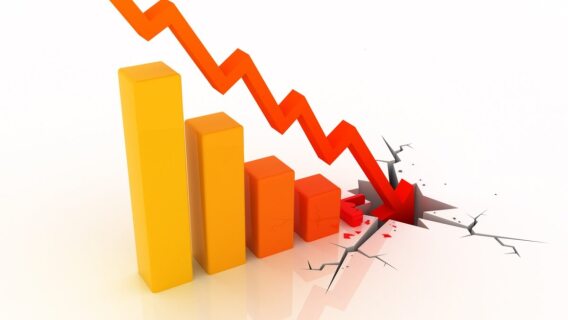After Monday’s carnage, what was a market crash is becoming a bear market. Scary times - but incredible opportunities lie ahead for those who wait out the storm.
The coronavirus has become a major market event.
The S&P 500 has plunged 18.9% from the highs of last month. That means we’re just over one percentage point from this officially being the end of the bull market, which has run since March 9, 2009—exactly 11 years to the day. In its place, a coronavirus bear market appears primed to take hold.
The virus originated in China and spread throughout that country, causing massive disruptions. Whole cities were completely shut down as people were quarantined and businesses and schools were closed. The virus has subsequently spread throughout the world.
[text_ad]
So far, the virus has not spread to near the degree in other countries as it did in China. However, the consensus opinion among more recently infected nations is that only with China-like disruptions can the spread be contained. These measures are already being implemented in Japan, Korea and Italy.
With the virus spreading in the U.S., it seems likely at this point, if not inevitable, that such disruptions in the form of business closings, school closings and event cancelations will occur here as well.
Circumstances conspire to make it wise for government organizations and businesses to err on the side of caution. From a public relations standpoint, there is little consequence to overreacting, or being too safe, while there is a plethora of potentially nasty repercussions politically and legally for being perceived as not having done enough.
The economic disruption has the potential to be massive, at least in the short term. It could possibly lead to negative economic growth and potentially plunge the U.S. economy into recession. But nobody really knows at this point, and that’s the problem. Uncertainty is preventing the market from finding a bottom, and the lack of a bottom is causing panic among investors.
Today, the global economy is experiencing collateral repercussions. Oil prices are crashing as Russia is refusing to support the price with production cuts. And as the market plummets other things break, adding to the downside spiral.
Coronavirus Bear Market is Here to Stay
It remains unknowable what the extent of the economic disruptions both here and abroad will be, or how long they will last. It is unlikely that the market will meaningfully recover before things start getting better and not worse and there is some sense as to the extent of the damage to the economy. Those things are highly unlikely to be known in the next several weeks.
The market may periodically bounce back as traders and bargain hunters step in, but headline risk will be constant in the weeks ahead. And it is unlikely the market has seen the bottom yet.
What does this mean for you as an investor?
If you have been investing for a long time, you have certainly seen periodic market selloffs. Recently the S&P 500 fell about 20% in December 2018, by the same amount in the summer of 2011, and over 50% during the financial crisis in 2008 and 2009.
Such selloffs are the price you pay for superior longer-term returns. Nothing is free. However, over time the market tends to move higher. Consider this: If you invested in the market index at the market highs in 2007, just ahead of the worst recession and market crash since the Great Depression, that investment would have appreciated more than 150% today, for an average annual return of about 7.5%.
That is still a better return than you would have earned in any other asset class. And that’s with the worst timing possible. It’s also well worth noting that you could have generated much higher returns if you added money along the way, especially in the early years of the recovery.
Markets fall but they always recover. And there is a likelihood that the market will recover from this selloff rather quickly. The selloff has occurred because of one single black swan event, the coronavirus. It’s not because the economy was faltering or the recovery had run out of gas. It’s not because of economic excess or bubbles that accrued during the recovery.
When the coronavirus hysteria finally fades and the market bottoms, the economy will likely shift into high gear to make up for lost time. The carnage will end and fear will wane. It always does. And the same dynamic that has driven the market higher for these past 11 years will again apply: money has no place else to go but stocks to fetch a decent return.
The market will also be free of the uneasy stigma of being high priced in the oldest recovery and bull market in history. Instead, it will be a renewal. The best time to invest in stocks in when the market is down. History has shown that, over time, these down markets create the best opportunities to invest.
The pain of watching your returns evaporate and your portfolio value decline is offset by the tremendous opportunities that will evolve. Down times like this are when you can truly enhance your longer-term returns.
When the dust finally settles on this coronavirus bear market, a world of opportunities will open up. And Cabot advisors are the very best in the business at finding them.
Things may get worse before they get better. The carnage may not be over. But things will get better. Your investments will likely recover over time and reward you for staying the course. But at some point you will have a fantastic chance to take advantage of the situation and potentially make the best investments of a lifetime.
Bear markets are part of investing and can ultimately turn out to be a very good thing for those who are longer-term oriented and act boldly.
[author_ad]

